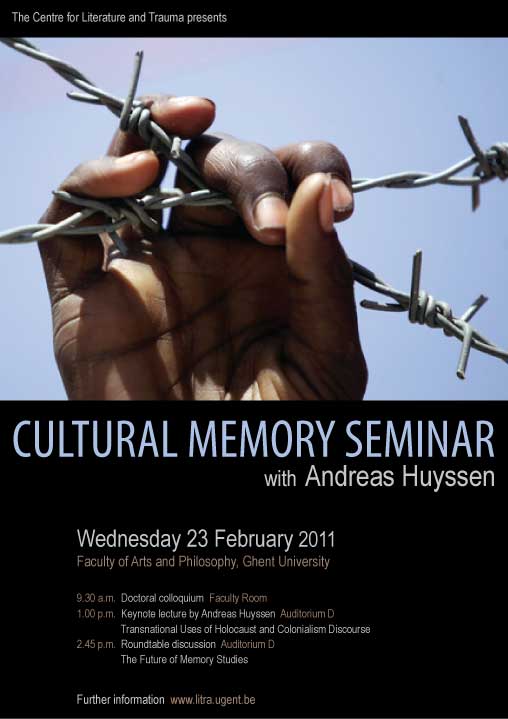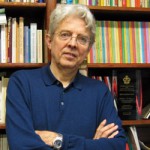
Cultural Memory Seminar with Andreas Huyssen
Event date: Wednesday 23 February 2011, 9.30 a.m. – 3.45 p.m.
Location: Faculty of Arts and Philosophy, Blandijnberg 2, Faculty Room and Auditorium D
In the course of the 1980s memory emerged as an urgent topic of debate in the humanities. By now a great deal of research has been devoted to “cultural memory,” a term coined by Jan Assmann which highlights the role of culture in the formation and transmission of collective memories. However, it has been observed that memory studies is “more practiced than theorized,” and practiced, moreover, within “an array of different disciplines and national academic cultures, with their own vocabularies, methods, and traditions.” Cultural memory studies is a blooming but as yet incoherent and dispersed field, characterized by a host of different terminologies rather than a common, generally-agreed-upon conceptual foundation. This seminar will help doctoral researchers from various disciplinary backgrounds strengthen the methodological and theoretical underpinnings of their PhD projects, refine their research questions, and gain further insight into current trends and future directions in scholarship about the intersections of memory and culture. It will serve as an interactive forum in which junior and senior memory scholars present their own and respond to one another’s research and reflect on new developments in the field.
 A central role in the seminar will be played by Andreas Huyssen, who will respond to the doctoral presentations, deliver a keynote lecture, and participate in a roundtable discussion. Huyssen is the Villard Professor of German and Comparative Literature at Columbia University, where he served as founding director of the Center for Comparative Literature and Society and as chair of the Department of Germanic Languages. His research and teaching focus on eighteenth-to-twentieth-century German literature and culture, international modernism, Frankfurt School critical theory, postmodernism, urban culture and globalization, and cultural memory of historical trauma in transnational contexts. His latest project considers the overlaps and tensions between the contemporary discourses of memory and human rights. While Huyssen has distinguished himself in many domains, he has been invited for this event in his capacity as an indisputable authority in cultural memory studies. The author of genuinely seminal and influential publications such as Twilight Memories: Marking Time in a Culture of Amnesia(Routledge, 1995) and Present Pasts: Urban Palimpsests and the Politics of Memory(Stanford UP, 2003), Huyssen has had, and continues to have, a tremendous impact on this field of study.
A central role in the seminar will be played by Andreas Huyssen, who will respond to the doctoral presentations, deliver a keynote lecture, and participate in a roundtable discussion. Huyssen is the Villard Professor of German and Comparative Literature at Columbia University, where he served as founding director of the Center for Comparative Literature and Society and as chair of the Department of Germanic Languages. His research and teaching focus on eighteenth-to-twentieth-century German literature and culture, international modernism, Frankfurt School critical theory, postmodernism, urban culture and globalization, and cultural memory of historical trauma in transnational contexts. His latest project considers the overlaps and tensions between the contemporary discourses of memory and human rights. While Huyssen has distinguished himself in many domains, he has been invited for this event in his capacity as an indisputable authority in cultural memory studies. The author of genuinely seminal and influential publications such as Twilight Memories: Marking Time in a Culture of Amnesia(Routledge, 1995) and Present Pasts: Urban Palimpsests and the Politics of Memory(Stanford UP, 2003), Huyssen has had, and continues to have, a tremendous impact on this field of study.
Programme
| 9.30 a.m. – 10.50 a.m. | WelcomeLore Colaert (UGent),“’Not Just Bones’: A Cultural History of Mass Grave Exhumations in Spain”
Jasper Rigole (KASK), “When Collected Memory Becomes Collective Memory: A Non-Authorial Voice-Over for the Film Paradise Recollected” Toby Smethurst (UGent), “Multidirectional Memory and the Retrofitting of Trauma in Pat Barker and W. G. Sebald” Response by Andreas Huyssen (Columbia University) |
| 10.50 a.m. – 11.10 a.m. | Coffee/tea |
| 11.10 a.m. – 12.00 p.m. | Maaike Van Liefde (UGent), “Conflicting Memories of the GDR and the Wende in the Work of Thomas Brussig”Bieke Willem (UGent), “Marginalizing Memory? Architecture and Narratives of Remembrance in Santiago de Chile”
Response by Andreas Huyssen (Columbia University) |
| 12.00 p.m. – 1.00 p.m. | Lunch |
| 1.00 p.m. – 2.15 p.m. | Andreas Huyssen (Columbia University), “Transnational Uses of Holocaust and Colonialism Discourse”Response by Sarah De Mul (KU Leuven) |
| 2.15 p.m. – 2.45 p.m. | Coffee/tea [venue: English Studies Meeting Room] |
| 2.45 p.m. – 3.45 p.m. | Roundtable discussion on “The Future of Memory Studies” with Ortwin de Graef (KU Leuven), Andreas Huyssen (Columbia University), Vivian Liska (UA), David Miller (University of Stirling), and Pieter Vermeulen (UGent) |
Members of the Doctoral School of Arts, Law, and Humanities can gain credits for the doctoral training programme (transferable skills training, cluster research and valorization) by participating in this event. Click here for the details.
